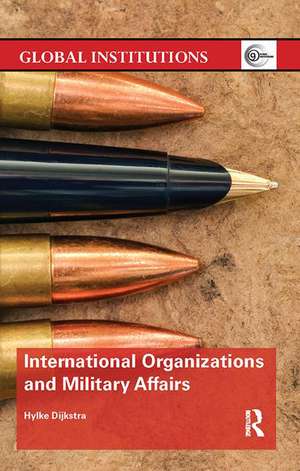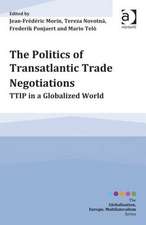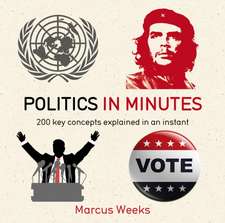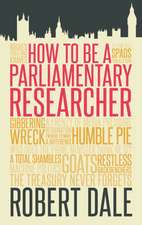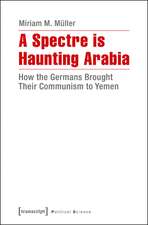International Organizations and Military Affairs: Global Institutions
Autor Hylke Dijkstraen Limba Engleză Paperback – 26 apr 2017
The book presents six empirical chapters on the UN, NATO, and EU secretariats. It provides new data from a unique dataset and in-depth interviews. It shows that member states employ a wide range of control mechanisms to reduce the potential loss of influence. They frequently forfeit the gains of delegation to avoid becoming dependent on the work of secretariats. Yet while states invest heavily in control, this book also argues that they cannot benefit from the services of secretariats and keep full control over outcomes in international organizations. In their delegation and control decisions, states face trade-offs and have to weigh different cost categories: the costs of policy, administrative capacity, and agency loss.
This book will be of interest to scholars, postgraduates, and officials in international organizations and national governments, dealing with questions of international political economy, security studies, and military affairs.
| Toate formatele și edițiile | Preț | Express |
|---|---|---|
| Paperback (1) | 370.87 lei 6-8 săpt. | |
| Taylor & Francis – 26 apr 2017 | 370.87 lei 6-8 săpt. | |
| Hardback (1) | 1053.92 lei 6-8 săpt. | |
| Taylor & Francis – 22 feb 2016 | 1053.92 lei 6-8 săpt. |
Din seria Global Institutions
-
 Preț: 286.42 lei
Preț: 286.42 lei -
 Preț: 329.60 lei
Preț: 329.60 lei -
 Preț: 303.16 lei
Preț: 303.16 lei -
 Preț: 279.80 lei
Preț: 279.80 lei -
 Preț: 279.88 lei
Preț: 279.88 lei -
 Preț: 309.04 lei
Preț: 309.04 lei -
 Preț: 326.01 lei
Preț: 326.01 lei -
 Preț: 271.46 lei
Preț: 271.46 lei -
 Preț: 310.65 lei
Preț: 310.65 lei -
 Preț: 301.39 lei
Preț: 301.39 lei -
 Preț: 295.35 lei
Preț: 295.35 lei -
 Preț: 365.03 lei
Preț: 365.03 lei -
 Preț: 299.26 lei
Preț: 299.26 lei -
 Preț: 326.36 lei
Preț: 326.36 lei -
 Preț: 356.45 lei
Preț: 356.45 lei -
 Preț: 188.79 lei
Preț: 188.79 lei -
 Preț: 345.89 lei
Preț: 345.89 lei -
 Preț: 363.25 lei
Preț: 363.25 lei -
 Preț: 363.20 lei
Preț: 363.20 lei - 18%
 Preț: 1001.55 lei
Preț: 1001.55 lei - 26%
 Preț: 761.76 lei
Preț: 761.76 lei - 18%
 Preț: 999.82 lei
Preț: 999.82 lei -
 Preț: 447.90 lei
Preț: 447.90 lei -
 Preț: 384.16 lei
Preț: 384.16 lei -
 Preț: 440.69 lei
Preț: 440.69 lei -
 Preț: 369.18 lei
Preț: 369.18 lei -
 Preț: 368.90 lei
Preț: 368.90 lei -
 Preț: 345.89 lei
Preț: 345.89 lei -
 Preț: 360.10 lei
Preț: 360.10 lei - 18%
 Preț: 998.71 lei
Preț: 998.71 lei - 18%
 Preț: 1113.25 lei
Preț: 1113.25 lei -
 Preț: 358.84 lei
Preț: 358.84 lei - 17%
 Preț: 246.93 lei
Preț: 246.93 lei - 18%
 Preț: 1160.47 lei
Preț: 1160.47 lei - 18%
 Preț: 1052.38 lei
Preț: 1052.38 lei -
 Preț: 381.03 lei
Preț: 381.03 lei -
 Preț: 364.51 lei
Preț: 364.51 lei - 26%
 Preț: 819.48 lei
Preț: 819.48 lei - 18%
 Preț: 1111.51 lei
Preț: 1111.51 lei - 18%
 Preț: 999.46 lei
Preț: 999.46 lei
Preț: 370.87 lei
Preț vechi: 394.68 lei
-6% Nou
Puncte Express: 556
Preț estimativ în valută:
70.97€ • 74.28$ • 59.07£
70.97€ • 74.28$ • 59.07£
Carte tipărită la comandă
Livrare economică 01-15 aprilie
Preluare comenzi: 021 569.72.76
Specificații
ISBN-13: 9781138065093
ISBN-10: 1138065099
Pagini: 258
Dimensiuni: 138 x 216 x 28 mm
Greutate: 2.63 kg
Ediția:1
Editura: Taylor & Francis
Colecția Routledge
Seria Global Institutions
Locul publicării:Oxford, United Kingdom
ISBN-10: 1138065099
Pagini: 258
Dimensiuni: 138 x 216 x 28 mm
Greutate: 2.63 kg
Ediția:1
Editura: Taylor & Francis
Colecția Routledge
Seria Global Institutions
Locul publicării:Oxford, United Kingdom
Public țintă
Postgraduate and UndergraduateCuprins
Part I: Introduction and Theory 1. Introduction 2. Agency and Control of International Secretariats Part II: The Politics of Institutional Development 3. United Nations Department of Peacekeeping Operations 4. NATO International Staff 5. European External Action Service Part III: The Politics of Mandate Formulation 6. United Nations Mission in South Sudan 7. NATO Operation Unified Protector in Libya 8. The EU Anti-Piracy Operations off the Coast of Somalia Part IV: Conclusion 9. Conclusion
Notă biografică
Hylke Dijkstra is an Assistant Professor with tenure at the Department of Political Science of Maastricht University, The Netherlands. He was previously a Marie Curie fellow at the Department of Politics and International Relations of the University of Oxford, UK, where he was also affiliated to Nuffield College. He has widely published on the EU, NATO, and UN.
Recenzii
"The focus on three rather than on only one organization sets the book apart from other contributions…International Organizations and Military Affairs seems to answer the broader question of how the member states try to minimize agency costs (states can do this through non-delegation, agent selection, or actual control.) The book will be of interest to scholars working in the principal-agent tradition, but also to anyone working on international peacekeeping and international organizations more broadly." - Kseniya Oksamytna, University of Warwick, ACUNS
"International Organizations and Military Affairsbreaks new ground in that it thoroughly applies [principal-agent] insights to new territory and moreover does so in a comparative fashion – two significant lacunae in the study of security IOs. [It] provides a fruitful starting point for inquiring into P/A dynamics across a greater range of security IOs, deployment cases, and stages of the policy cycle … Dijkstra in many ways steers us in the right direction." — Sebastian Mayer, University of Bremen
"The book is rich in both its theoretical and empirical dimensions, and offers an encompassing and highly compelling analysis with many fresh insights.” - Mai’a K. Davis Cross, Northeastern University
"International organizations and military affairs is an interesting and important book. It does what few people have done before, notably look comparatively as well as in a theoretically informed way at how states cooperate in military affairs through international organizations." - Anand Menon, King’s College London, International Affairs
"Hylke Dijkstra has written a highly interesting book that deserves to be widely read ... The book is well written and the conclusion is refreshing ... The bottom line is that every analyst of international cooperation will benefit from Dijkstra’s careful assessment of institutional trends in the UN, NATO, and the EU." - Sten Rynning, University of Southern Denmark
"At a point in time when global governance is running into the quicksand of power politics, it is well worth revisiting the underlying mechanics of international organisations. Hylke Dijkstra’s book does precisely that with respect to their growing role in military affairs." - Alexander Mattelaer, Institute for European Studies, Brussels
"Hylke Dijkstra’s book is a good read for those involved in the law of international organizations." — Ramses Wessel, University of Twente
"International Organizations and Military Affairs captures the breadth and depth of the interconnections between member states and international secretariats. Moreover, it offers not only an important scholarly contribution, but also fills a crucial gap for anyone who seeks to gain a better understanding of the politics within international organisations and international military collaborations." — Kai Chen, LSE Review of Books
"International Organizations and Military Affairsbreaks new ground in that it thoroughly applies [principal-agent] insights to new territory and moreover does so in a comparative fashion – two significant lacunae in the study of security IOs. [It] provides a fruitful starting point for inquiring into P/A dynamics across a greater range of security IOs, deployment cases, and stages of the policy cycle … Dijkstra in many ways steers us in the right direction." — Sebastian Mayer, University of Bremen
"The book is rich in both its theoretical and empirical dimensions, and offers an encompassing and highly compelling analysis with many fresh insights.” - Mai’a K. Davis Cross, Northeastern University
"International organizations and military affairs is an interesting and important book. It does what few people have done before, notably look comparatively as well as in a theoretically informed way at how states cooperate in military affairs through international organizations." - Anand Menon, King’s College London, International Affairs
"Hylke Dijkstra has written a highly interesting book that deserves to be widely read ... The book is well written and the conclusion is refreshing ... The bottom line is that every analyst of international cooperation will benefit from Dijkstra’s careful assessment of institutional trends in the UN, NATO, and the EU." - Sten Rynning, University of Southern Denmark
"At a point in time when global governance is running into the quicksand of power politics, it is well worth revisiting the underlying mechanics of international organisations. Hylke Dijkstra’s book does precisely that with respect to their growing role in military affairs." - Alexander Mattelaer, Institute for European Studies, Brussels
"Hylke Dijkstra’s book is a good read for those involved in the law of international organizations." — Ramses Wessel, University of Twente
"International Organizations and Military Affairs captures the breadth and depth of the interconnections between member states and international secretariats. Moreover, it offers not only an important scholarly contribution, but also fills a crucial gap for anyone who seeks to gain a better understanding of the politics within international organisations and international military collaborations." — Kai Chen, LSE Review of Books
Descriere
The member states of international organisations increasingly delegate the planning and conduct of multinational military operations to international secretariats. In carrying out their functions, these officials not only facilitate the work of the member states, but can also pursue their own distinct agendas. This book analyses how states seek to control secretariats when it comes to military missions by international organisations, and introduces an innovative theoretical framework that identifies different types of control mechanisms. It presents six empirical chapters on the UN, NATO and EU secretariats and provides new data from a unique dataset and 45 in-depth interviews.
